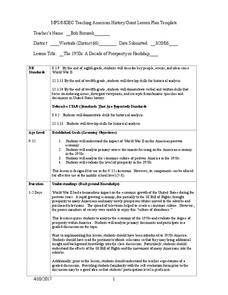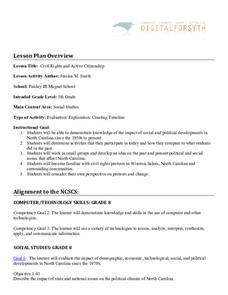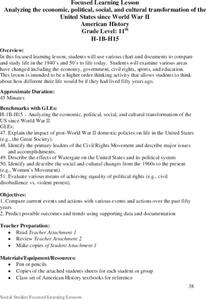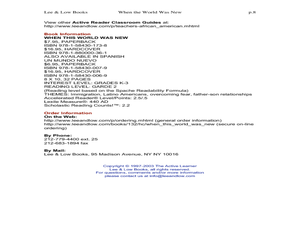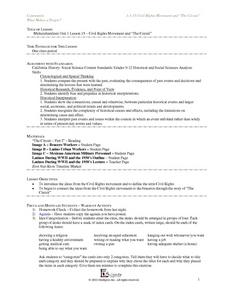Curated OER
American Economics after WWII
Young scholars analyze the American culture after WWII. Through a variety of activities, students gain an understanding of ecomonics and prosperity in the US following WWII.
Curated OER
The Brief American Pageant: The Cold War Begins
With the beginning of the Cold War came numerous social and political changes around the world - many of which are featured in this series of maps and graphs. This short but informative slideshow will help to bridge the gap between a...
Bill of Rights Institute
Post-WWII Boom: Transition to a Consumer Economy
The war is over! Scholars investigate an AP review video to uncover the post-WWII era in the United States. Viewers examine and analyze the consumerism that arose in post-war America. This is the eighth installment of a nine-part...
Stanford University
Public Housing
The Fair Deal was meant to give Americans after World War II a basic standard of living. Those in public housing often found that promise fell short. Learners consider whether the effort was successful by evaluating images, testimonies,...
Curated OER
Jazz in America Lesson Plan 6
Students survey bebop, cool jazz, and hard bop. They explore how bebop, cool jazz, and hard bop reflected American culture and society in the 1940s and 1950s.
Digital Forsyth
Civil Rights and Active Citizenship
As part of a study of the American Civil Rights movement, class members search the Internet to find important facts, people, events, and pictures that they use to create a timeline of events between 1955 and 1970.
Curated OER
Focused Learning Lesson
Eleventh graders analyze charts and primary source documents to compare life in the 1940s and 1950s. They are encouraged to examine the economy, government, sports and education.
Curated OER
Consumer Culture in the 1950s: New Shopping Centers and Advertising trends
Students examine the effect of suburbs on American cities. They identify the changes the cities had to face after people moved elsewhere. Using primary source ads, they compare them with contemporary ads and discuss what can be found out...
Smithsonian Institution
Cuban Missile Crisis
The United States—specifically John F. Kennedy—played a large role during the Cuban Missile Crisis. A history resource poses questions that encourage critical thinking as well as in-depth analysis of images from the time period.
Curated OER
"The New Television Set" a Gateway to the Post World War II Era
Eleventh graders demonstrate their knowledge of the effects of television on the political, economic, religious, social, intellectual and artistic life of the US nation from the 1950's. Research how television shaped public opinion with...
Curated OER
Building Suburbia: Highways and Housing in Postwar America
High schoolers determine how suburbs changed America. In this post World War II lesson, students complete research projects that require them to examine the growth of suburbs in the 1950's and 1960's. High schoolers reveal how government...
Curated OER
China's Economy
Students examine China's economy. In this economics lesson, students investigate economic facts and indicators for the U.S. and China in order to compare and contrast these two large economies.
Curated OER
World War II: Causes and Consequences
Tenth graders examine Hitler's occupation of Europe and the Allies' efforts to fight it. In this World War II lesson, 10th graders examine how World War II changed American society, especially for women. Students analyze a...
Curated OER
Johnson's Great Society (5)
In this online interactive American history instructional activity, learners answer 15 matching questions regarding Lyndon B. Johnson and the Great Society. Students may submit their answers to be scored.
Student Handouts
A Society in Transition
Cover the 1980s in your class with a brief informational text and seven related questions. The one-page reading passage includes general information about jobs and skills, population patterns, and the AIDS epidemic.
Curated OER
Prosperity and Challenges
Students watch a slideshow about the technological advances in agriculture. After viewing, they complete an index card about one aspect of the slideshow. In groups, they create a cause and effect timeline in which they identify specific...
Curated OER
When This World Was New
Second graders participate in a guided reading activity and read about and immigrant family. In this guided reading lesson, 2nd graders answer questions that focus on their new homeland. Students write a response to literature.
Curated OER
Levittown, White Picket Paradise?
Students study the origins and happenings of Levittown, Pennsylvania. In this Pennsylvania history lesson plan, students use primary and secondary sources to research the beginnings of Levittown, PA. As a culminating activity, students...
Curated OER
Racial Inequality: Remnants of a Troubled Time
Eighth graders study the ratification of the 14th Amendment and the Plessy v. Ferguson decision. In this US History lesson, 8th graders read excerpts from the Brown v. Board of education decision. Students investigate one of...
Curated OER
Urban Renewal
Eleventh graders write down their best guess at the meaning of "urban renewal." students stage a Mayor's press conference announcing a new urban development plan for the Fillmore.
Curated OER
"The Circuit" and the Civil Rights Movement
Students compare and contrast concepts of the civil rights movement to the concepts presented in the short story, "The Circuit." In groups, they sort a series of ideas written on index cards into two categories - rights and freedoms. ...
Curated OER
You Mean I Am Part of History?
Fourth graders open the lines of communication between family members and to gain a historical understanding about family history. They research and interview their grandparents and parents and create a research paper.
SparkNotes
Spark Notes: Social Trends of the 1950s
Spark Notes gives a brief overview of the 1950s from consumerism and conformity to poverty to youthful rebellion. A good review of this important decade in American history.
Read Works
Read Works: Excerpt From "The Fifties": The Affluent Society
[Free Registration/Login Required] Abridged from the full text located at the Gilder Lehrman Institute of American History, this passage provides information about economic wealth of Americans living during the 1950's. Paired texts are...


